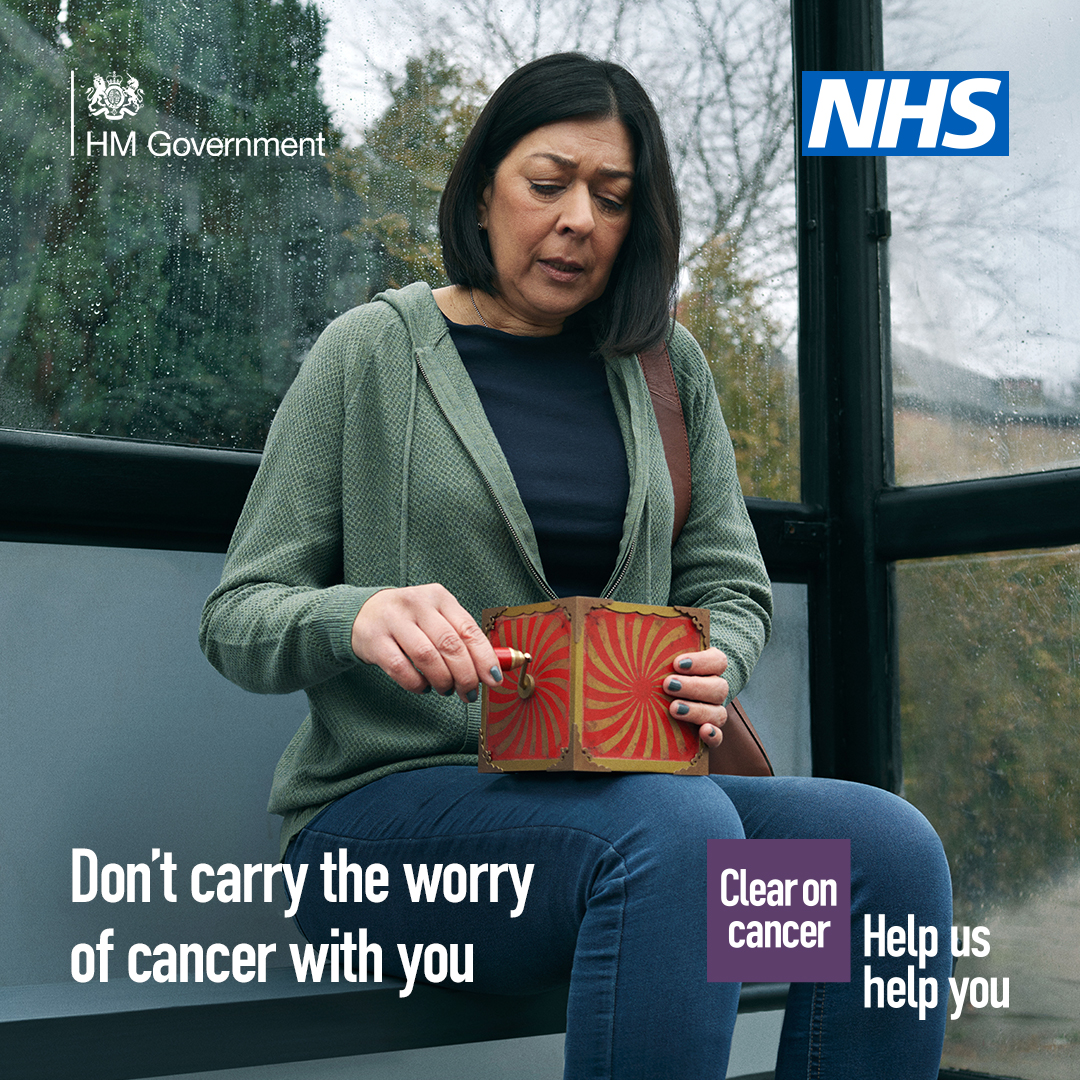Please see the NHS Be Clear on Cancer website for further information about symptoms that you should discuss with us.
Don’t carry the worry of cancer with you.
If something in your body doesn’t feel right, talk to us. Tests could put your mind at rest. Until you find out, you can’t rule it out.
Your risk of developing cancer depends on many factors, including age, genetics and lifestyle, but in some cases the exact cause is difficult to determine.
However, it is well known that two in five cancer cases in the UK each year are preventable and are linked to lifestyle factors.
Spotting cancer early will improve your survival rate, so it’s important that you recognise the signs and act.

These are some of the key signs and symptoms of cancer. But if something’s unusual for you, it’s best to tell your doctor - even if it’s not on the list.
- croaky voice, hoarseness or a cough that won't go away
- mouth or tongue ulcer that lasts longer than three weeks
- coughing up blood
- breathlessness
- difficulty swallowing
- persistent heartburn or indigestion
- unusual changes to the size, shape or feel of a breast, including nipple or skin changes
- appetite loss
- persistent bloating
- a change in bowel habit, such as constipation, looser poo or pooing more often
- blood in your poo
- unexplained vaginal bleeding, including after sex. between periods or after the menopause
- blood in your pee
- problems peeing
- very heavy night sweats
- appetite loss
- fatigue
- unexplained weight loss
- an unexplained pain or ache
- an unusual lump or swelling anywhere on your body
- a new mole or changes to a mole
- a sore that won't heal
A cough that lasts three weeks or more could be a warning sign. Contact your GP practice.
If you’ve had tummy trouble such as discomfort or diarrhoea for three weeks or more, or seen blood in your pee - even just once, it could be a sign of cancer. It’s probably nothing serious, but finding cancer early makes it more treatable.
Your NHS wants to see you: nhs.uk/cancersymptoms
Screening programmes
One of the best things that you can do is remember to attend or complete screening invitations – it is one of the most effective ways to identify any early signs of cancer.
The UK has three main programmes: breast, cervical and bowel.
Find out some more information on the Cancer Research UK website.
Cervical
You will be contacted when you are due to attend cervical screening (smear test).
Screening is for patients with a womb/cervix aged 25-64 years.
We operate total discretion for patients whom may no longer identify as their birth assigned gender. It is still important to attend your screening. Please contact us if you require any special arrangements.
The test is quick and does not cause pain.
You can bring someone with you, play some music or chat to our friendly nursing team whilst the sample is taken.
We'd prefer if you attended without children however we understand that it is difficult to arrange childcare and we'd much rather complete the screening without delay.
The sample is tested for the presence of the Human Papilloma virus. Some high risk types of this virus are known to sometimes cause abnormal cells to develop; these can lead to cancers.
Breast
A mammogram is a type of x-ray that helps to identify presence of cancer in the breast.
Anyone registered as female will be automatically invited every 3 years between the age of 50 and 71.
If you no longer identify as your gender assigned at birth, please contact us if you have not been invited.
If you are over 71 and would still like to attend screening, contact the local screening service.
What are the sings and symptoms of breast cancer?
- A change in the size, outline or shape of your breast
- A discharge of fluid from either of your nipples
- Changes in your skin such as puckering, dimpling, colour or a rash
- Any change in nipple position (pulled in or pointing differently)
- A new lump, thickening or bumpy area in one breast or armpit
- Swelling in your armpit, collarbone or breasts
- An eczema like rash, crusting, scaly, itching or redness on or around the nipple
- Breast pain is not normally a symptom of breast cancer
If you are concerned about any changes to your breasts, book an appointment to be examined without delay.
We can provide a chaperone or you can bring a relative or friend.
Remember, men can experience breast cancer too - the same symptoms apply.
A local charity, Lady McAdden provides advice and help to learn how to effectively check your breasts. Visit their website to find out more.

Bowel
The bowel cancer screening kit can save your life.
Just a tiny sample detects signs of cancer before you notice anything wrong.
If you’ve sent a kit, put it by the loo. Don’t put it off.
nhs.uk/bowel-screening
- The bowel screening service is currently available to 60 to 74 years old.
- The scheme is expanding to include patients from age 50.
- You'll receive a kit in the post, with instructions and a return envelope.
Return the kit in the envelope provided, in the Royal Mail postal service. Do not return it to us.
- It is called a faecal immunochemical test (FIT) and it checks for microscopic blood in the stool.
- Always make an appointment to see a Clinician if you are experiencing any signs of bowel cancer - do not wait to be invited for screening.
Signs of bowel cancer include a change in bowel habits that are unusual for you, weight loss, tummy pain, blood in your poo and bloating. If you are experiencing any of these, no matter what your age, book an appointment with a Clinician without delay.
If you would like to find out more information about living with cancer or supporting someone who has cancer please look at Macmillan and Cancer Research UK pages.